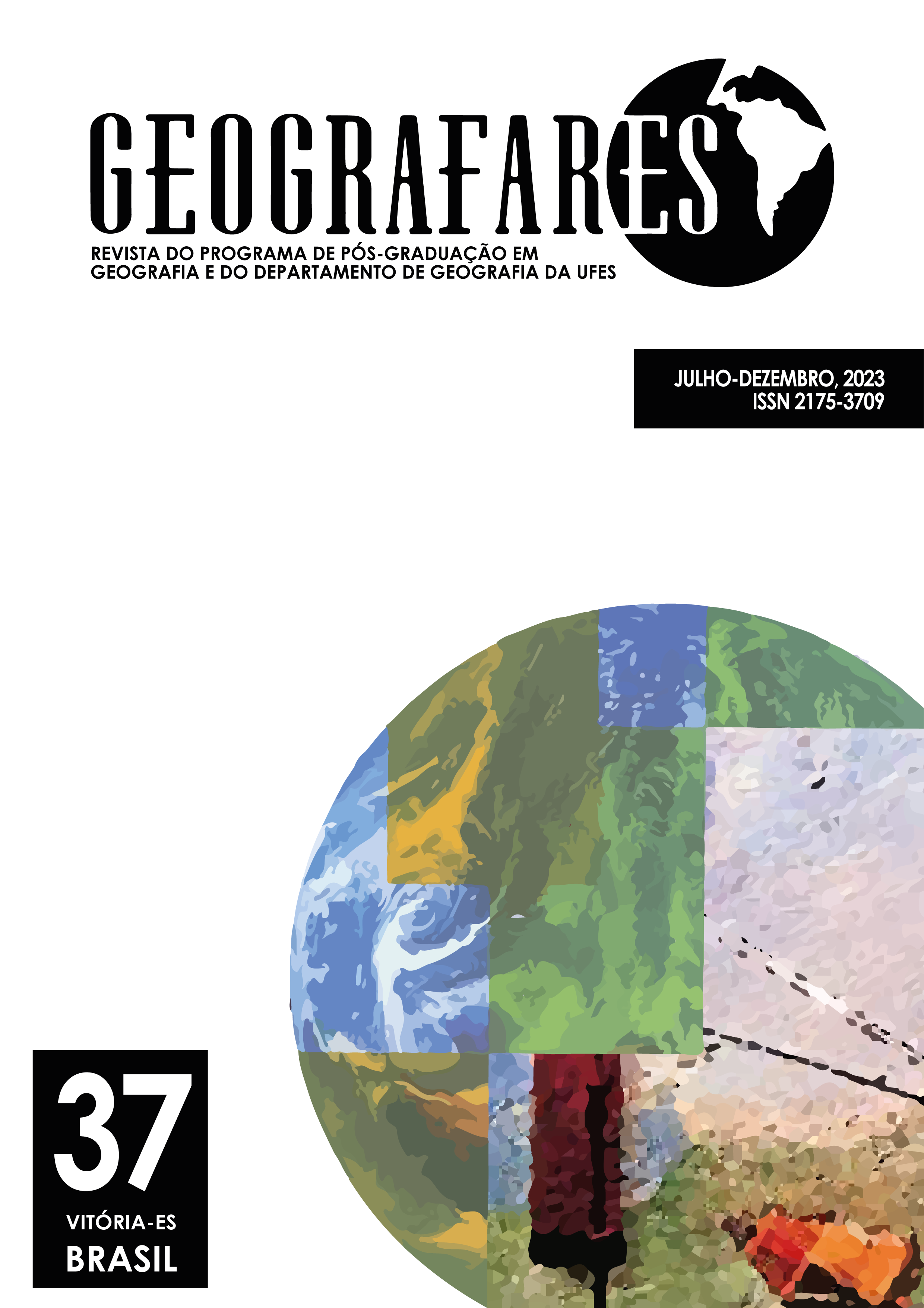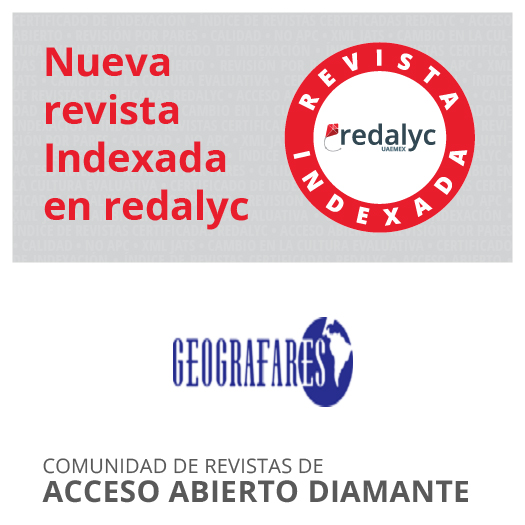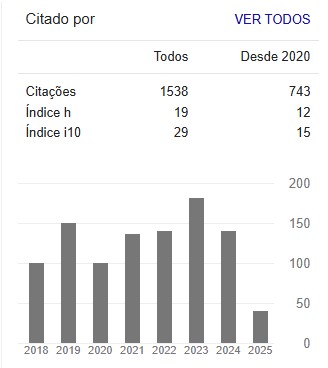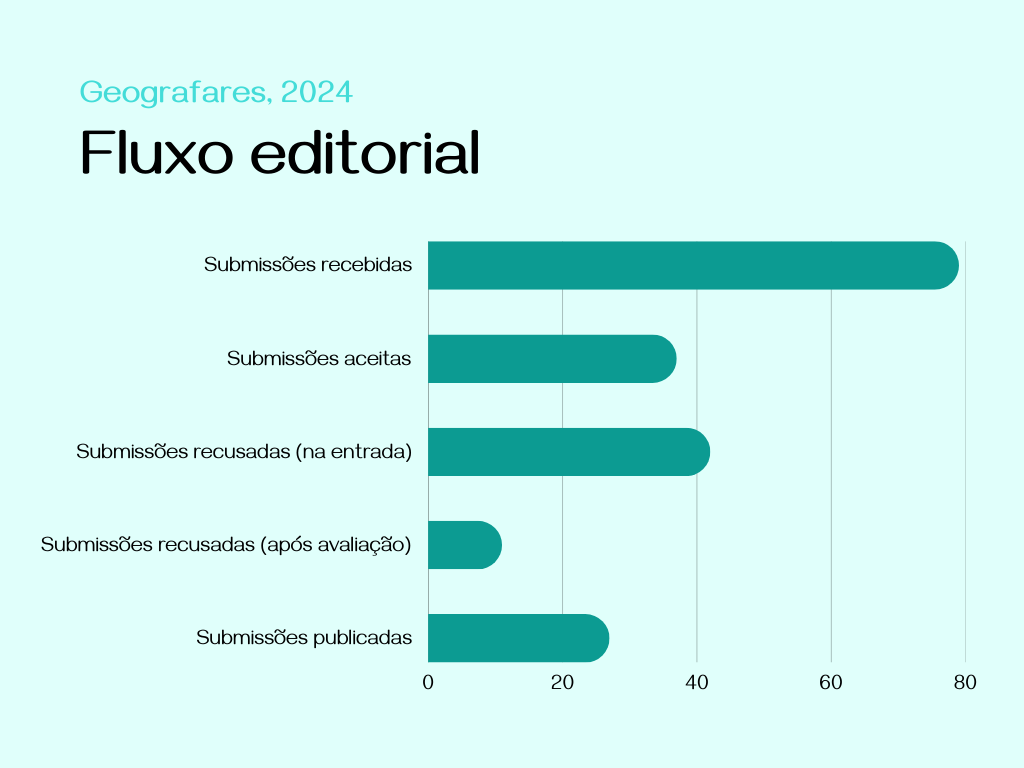The modern colonization of the tropics: geography and planning in the first half of the 20th century
DOI:
https://doi.org/10.47456/geo.v3i37.42336Keywords:
history of geography, colonization, planningAbstract
To discuss the planned colonizing of tropical regions, we consider the approaches employed by particular geographers during the early 20th century, when geography was still a nascent discipline. The argument is presented in two sections. First, this paper will briefly examine how the colonization of territories that were considered vacant, particularly in tropical regions, became a relevant topic in a geography already preoccupied with global matters. Second, within the historical context of the 1950s, this study examines Brazilian geography's evaluation of territorial colonization policies implemented in the country at that time.
Downloads
References
ARNOLD, D. The problem of nature: Environment, culture and European expansion. Oxford: Blackwell Publishers, 1996.
______. Illusory riches: Representations of the tropical world, 1840-1950. Singapore Journal of Tropical Geography, v. 21, n.1, p. 6-18, 2000. Disponível em: https://doi.org/10.1111/1467-9493.00060
BOWMAN, I. The Pionner Fringe. NY: American Geographical Society, 1931.
______. Limits of Land Settlement: a report on present-day possibilities. NY: Counsik of Foreign Relations 1937.
CLAYTON, D. ; BOWD, G. Geography, tropicality and postcolonialism: Anglophone and Francophone readings of the work of Pierre Gourou. L’Espace géographique, v. 35, n. 3, p. 208-221, 2006. Disponível em: https://www.jstor.org/stable/26236005
COSCIONI, F. J. O Darwinismo Social na Geografia Humana estadunidense: um estudo de obras selecionadas de Ellsworth Huntington e Ellen Semple. Tese (Doutorado em Geografia). São Paulo: FFLCH/USP, 2019.
DEFFONTAINES, P. Pays et paysages de l'État de Saint-Paul (Brésil). Première esquisse de division régionale. Annales de Géographie, v. 45, n. 253, pp. 50-71, 1936.
______. Mountain settlement in the Central Brazilian Plateau. Geographical Review, v.27, n.3, p. 394-413, 1937.
DEMANGEON, A. Dictionnaire-manuel-illustré de géographie. Paris: Armand Colin, 1907
______. Pionniers et fronts de colonisation. Annales de Géographie, v. 41, n. 234, p. 631-636, 1932.
______. Problèmes de Géographie Humaine, Paris,. Ed. Armand Colin, 1942.
DUTRA E SILVA, S. ; BELL, S. A colonização agrária no Brasil Central: fontes inéditas sobre as pesquisas de campo de Henry Bruman em Goiás na década de 1950. Topoi. Revista de História, Rio de Janeiro, v. 19, n. 37, p. 198-225, jan./abr. 2018. Disponível em: https://doi.org/10.1590/2237-101X01903709
FERRAZ, J. S. White Settlers in the Tropics. Comentários. Revista Brasileira de Geografia, v.3, n.2, p. 409-414, 1941.
FRANÇA, Ary. A Ilha de São Sebastião: estudo de geografia humana. Boletim FFLC n. 178 – Geografia n.10, São Paulo: USP, 1954.
GALLAIS, J. L’évolution de la pensée géographique de Pierre Gourou sur les pays tropicaux (1935-1970). Annales de Géographie, v. 90, n. 498, p.129-150, 1981.
GOUROU, P. Les Pays tropicaux: principes d’une géographie humaine et économique. Paris: PUF, 1947.
JAMES, P. A vegetation map of Paraná. Geographical Review, v.22, n.4, p.676-689, 1932.
______. Japanese colonization in Brazil. Geographical Review, v.27, n.1, p. 145-160, 1937.
KOHLHEPP, G. A importância de Leo Waibel para a geografia brasileira e o início das relações científicas entre o Brasil e a Alemanha no campo da geografia. Revista Brasileira de Desenvolvimento Regional. Blumenau, v.1, n.2, p. 29-75, 2013. Disponível em: http://dx.doi.org/10.7867/2317-5443.2013v1n2p029-075.
LIRA, L.A. Pierre Monbeig e a formação da Geografia no Brasil (1925-1956): uma geo-história dos saberes. São Paulo: Alameda, 2021.
MONBEIG, P. O homem branco e o meio tropical. Boletim Geográfico, v. 5, n. 50, p.123-125, 1947.
______. White Settlers in the Tropics. Resenha. Revista Brasileira de Geografia, v.3, n.1, p. 184-188, 1941.
______. Ensaios de Geografia Humana Brasileira. São Paulo: Martins, 1940.
MONTEIRO, C. A. F. A Geografia no Brasil (1934-1977): avaliação e tendências. São Paulo: Instituto de Geografia/ FFLCH/USP, 1980.
MORAES, A. C. R. Ideologias Geográficas - Espaço, Cultura e Política no Brasil. São Paulo: Hucitec, 1988.
______. Território e História no Brasil. São Paulo: Annablume, 2002.
NOGUEIRA, C.E. Ensaios de Geografia Histórica e História da Geografia. Vitória: Edufes/MC&G, 2021.
______. Rumar ao Oeste ou fincar os pés no Leste? O contexto da atuação de Leo Waibel no Brasil (1940/1950). Lira, L.A., Sousa Neto, M.F. e Duarte, R.B. (org.). Geografias das ciências, dos saberes e da história da geografia. São Paulo: Alameda, 2020.
______. O lugar da fronteira na geografia de Pierre Monbeig. Tese (Doutorado em Geografia Humana), São Paulo: FFLCH/USP, 2013.
OLIVEIRA, A.U. A Geografia agrária na obra de Orlando Valverde. SUERTEGARAY, D.M.A. et al (org.). Orlando Valverde: o geógrafo e sua obra. Porto Alegre: IGEO/UFRGS, 2017.
PAPY, Louis. En marge de l'empire du café, la façade atlantique de Sâo Paulo. Cahiers d'outre-mer, n. 20, p. 357-398, 1952.
PEREIRA, S.N. Na boca do sertão ou integrada ao ecúmeno? Militares, estatísticos, geógrafos e a localização da nova capital. In: SENRA, N. (org.). Veredas de Brasília: as expedições geográficas em busca de um sonho. Rio de Janeiro: IBGE, 2010.
PERES, E. P. “Proverbial hospitalidade”?: a revista de imigração e colonização e o discurso oficial sobre o imigrante (1945-1955). Acervo - Revista do Arquivo Nacional, v. 10, n. 2, p. 53-70, 1997.
PETRONE, P. A Baixada do Ribeira – Estudo de Geografia Humana. Boletim FFCL n. 283 – Geografia n. 14. São Paulo: USP, 1966.
PLATT, R.S. Coffee plantations of Brazil. Geographical Review, v.25, n.2, p.231-239, 1935.
PRICE, A.G. White settlers in the Tropics. New York: AGS, 1939.
ROBEQUAIN, C. L’Indochine francaise. Paris:Armand Colin, 1935.
ROBIC, M.C. Conhecer seu Mundo. Terra Brasilis (Online) v. 2, 2013. Disponível em: http://journals.openedition.org/terrabrasilis/900.
______. A crise dos anos trinta e a emergência de novos temas na geografia. Angotti-Salgueiro H. (org.). Pierre Monbeig e a geografia humana brasileira: a dinâmica da transformação. São Paulo, EDUSC, IEB, FAPESP, 2006.
______. Géographes face au monde. L’Union Géographique Internationale et les congrès internationaux de géographie. Paris/Montréal: L’Harmattan, 1996.
SAID, E. Orientalism. New York, Pantheon, 1978.
SEYFERTH, G. Colonização, imigração e a questão racial no Brasil. Revista USP, n. 53, p. 117-149. 2002
SION, J. Asie des Moussons. Geographie Universelle, t. 9. Paris: Armand Colin, 1929.
SMITH, N. American Empire. Roosevelt’s geographer and the prelude to globalization. Los Angeles: University of California Press, 2003.
VESSENTINI, J. W. A capital da Geopolítica. São Paulo: Ática, 1986.
WAIBEL, L. White settlement in Costa Rica. Geographical Review, v.29, n.4, p. 529-560, 1939.
Downloads
Published
How to Cite
Issue
Section
License
Copyright (c) 2023 Geografares

This work is licensed under a Creative Commons Attribution 4.0 International License.
Copyrights Declaration
Authors who publish in the journal agree with the following terms:
- Authors will keep their copyrights and grant the journal the right to their first publishing, simultaneously licenced under Creative Commons Attribution License which allows sharing their work with authorship recognition and initial release through this journal.
- Authors may sign additional contracts separately diffusing a non-exclusively version of the paper published in this journal (i.g. publishing in institutional repository or as a book chapter), once citing the authorship and initial release through this journal.
- Authors are encouraged to publicize and diffuse their paper online, for example onto institutional repositories or on their personal websites.




























